外研版(2019) 必修第一册 Unit 3 Family Matters Using language 课件-(35张ppt)
文档属性
| 名称 | 外研版(2019) 必修第一册 Unit 3 Family Matters Using language 课件-(35张ppt) |  | |
| 格式 | pptx | ||
| 文件大小 | 3.9MB | ||
| 资源类型 | 教案 | ||
| 版本资源 | 外研版(2019) | ||
| 科目 | 英语 | ||
| 更新时间 | 2022-12-27 12:17:02 | ||
图片预览

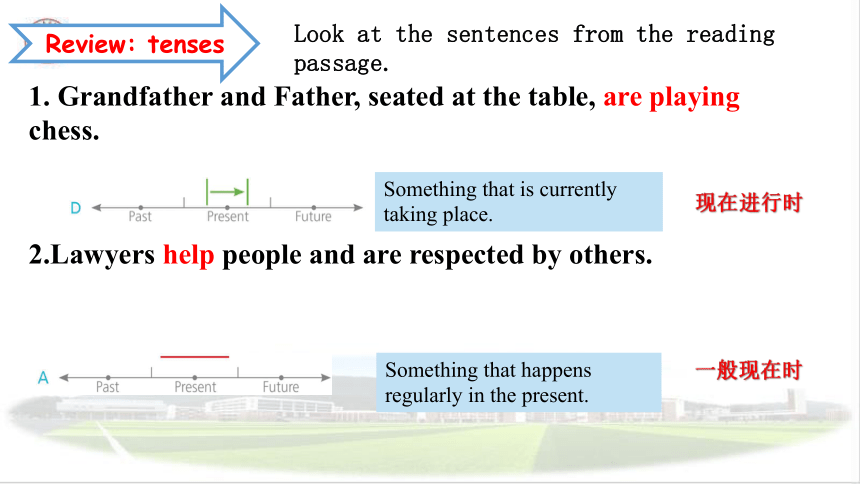
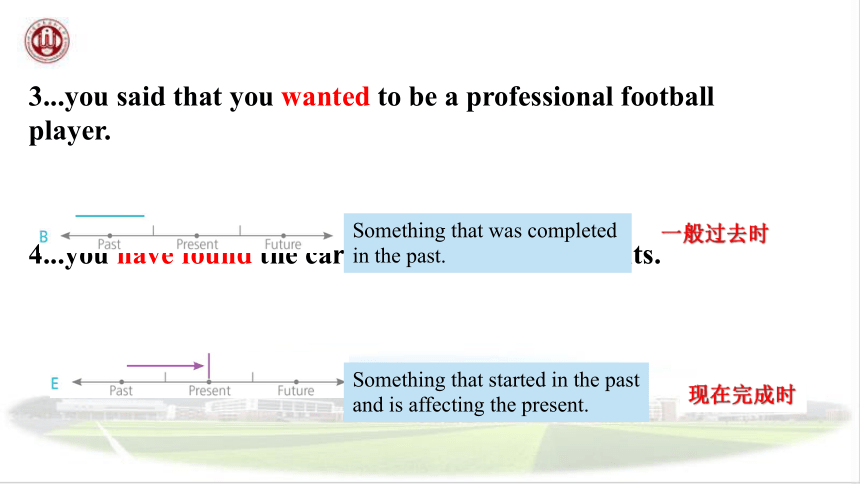

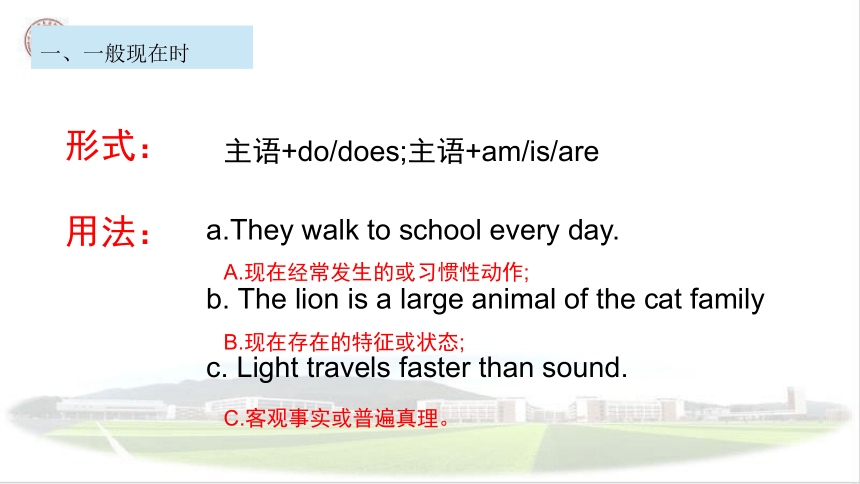
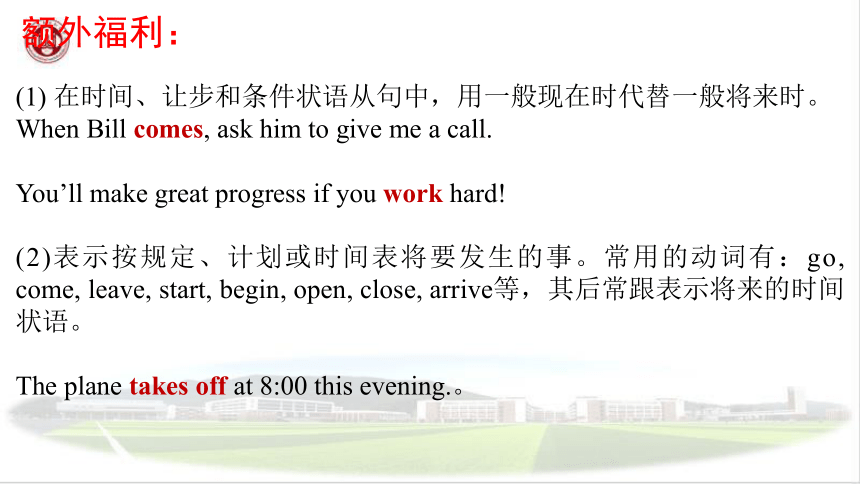
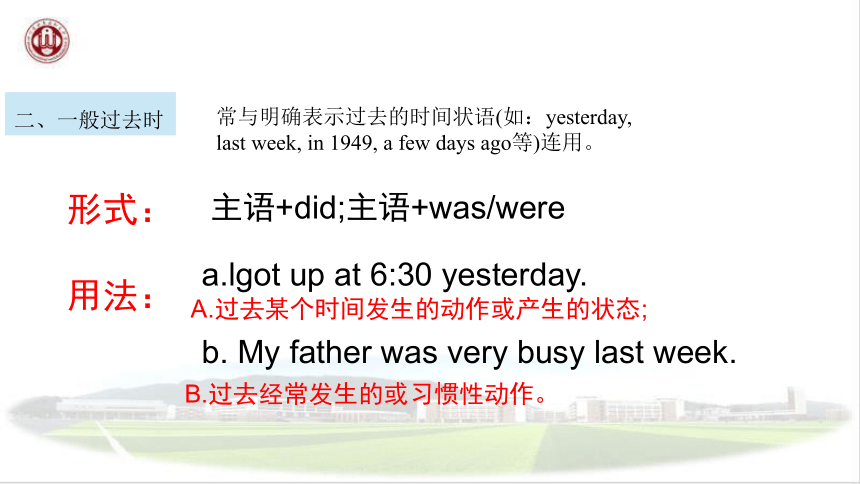
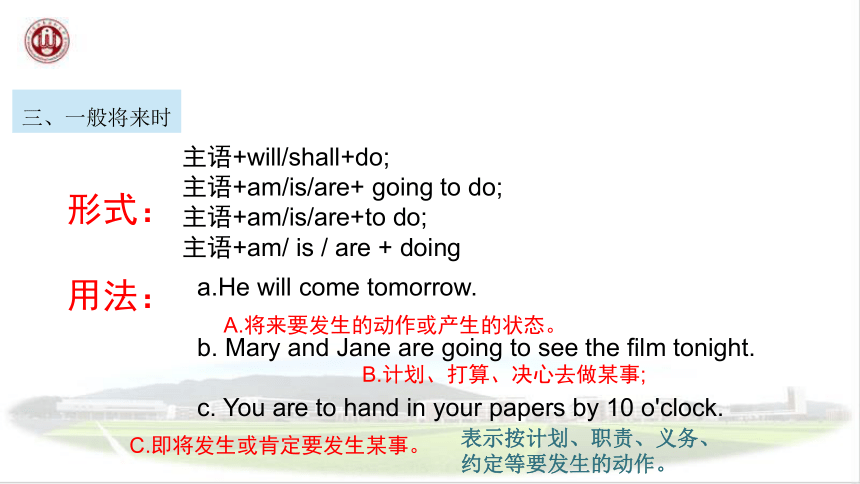

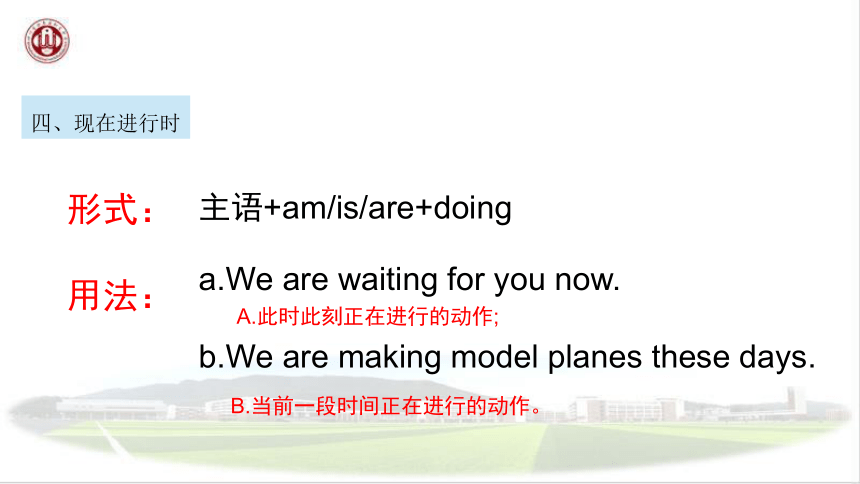

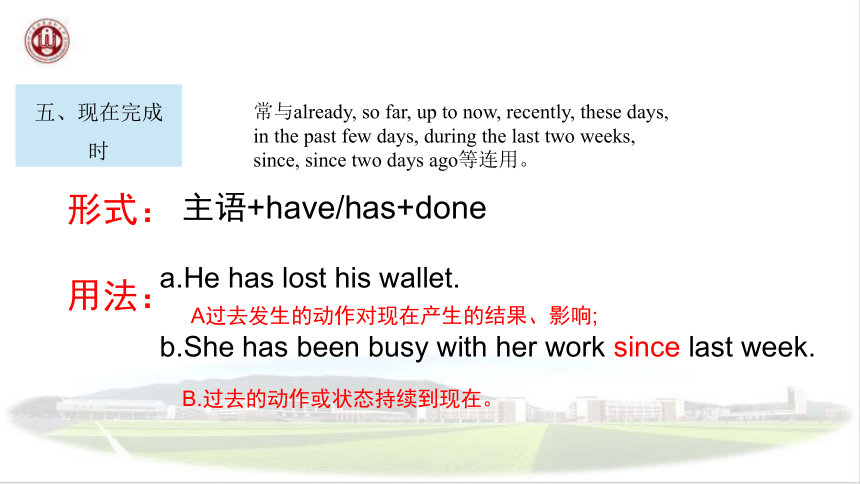
文档简介
(共35张PPT)
Unit 3
Family matters
Using language
1. Grandfather and Father, seated at the table, are playing chess.
2.Lawyers help people and are respected by others.
Look at the sentences from the reading passage.
Review: tenses
Something that is currently taking place.
现在进行时
Something that happens regularly in the present.
一般现在时
3...you said that you wanted to be a professional football player.
4...you have found the career that suits your talents.
Something that was completed in the past.
一般过去时
Something that started in the past and is affecting the present.
现在完成时
5...you will have two options for your future.
Something that is certain to take place in the future.
一般将来时
一、一般现在时
形式:
用法:
主语+do/does;主语+am/is/are
a.They walk to school every day.
b. The lion is a large animal of the cat family
c. Light travels faster than sound.
C.客观事实或普遍真理。
A.现在经常发生的或习惯性动作;
B.现在存在的特征或状态;
(1) 在时间、让步和条件状语从句中,用一般现在时代替一般将来时。
When Bill comes, ask him to give me a call.
You’ll make great progress if you work hard!
(2)表示按规定、计划或时间表将要发生的事。常用的动词有:go, come, leave, start, begin, open, close, arrive等,其后常跟表示将来的时间状语。
The plane takes off at 8:00 this evening.。
额外福利:
二、一般过去时
形式:
用法:
主语+did;主语+was/were
a.lgot up at 6:30 yesterday.
b. My father was very busy last week.
A.过去某个时间发生的动作或产生的状态;
B.过去经常发生的或习惯性动作。
常与明确表示过去的时间状语(如:yesterday, last week, in 1949, a few days ago等)连用。
形式:
用法:
三、一般将来时
主语+will/shall+do;
主语+am/is/are+ going to do;
主语+am/is/are+to do;
主语+am/ is / are + doing
a.He will come tomorrow.
b. Mary and Jane are going to see the film tonight.
c. You are to hand in your papers by 10 o'clock.
A.将来要发生的动作或产生的状态。
B.计划、打算、决心去做某事;
C.即将发生或肯定要发生某事。
表示按计划、职责、义务、
约定等要发生的动作。
(1) be about to do sth 意为“正要做某事;马上要做某事”。
The new school year is about to begin.
额外福利:
形式:
用法:
四、现在进行时
主语+am/is/are+doing
a.We are waiting for you now.
b.We are making model planes these days.
A.此时此刻正在进行的动作;
B.当前一段时间正在进行的动作。
(1)常与always, continually, constantly, forever等
表示频度的副词连用,表示经常、反复发生的动作,
常含有说话人的主观情绪。
You are always changing your mind.
额外福利:
形式:
用法:
五、现在完成时
主语+have/has+done
a.He has lost his wallet.
b.She has been busy with her work since last week.
A过去发生的动作对现在产生的结果、影响;
B.过去的动作或状态持续到现在。
常与already, so far, up to now, recently, these days, in the past few days, during the last two weeks, since, since two days ago等连用。
标志词语
一般现在时
every time 每次
in the morning早上
once a week每周一次
twice a month每月两次
hardly 几乎不
every sunday每个周日always总是
usually通常
often经常
sometimes有时
everyday每天
一般过去时
ago以前
yesterday昨天
the day before yesterday前天lasttime上次
last night昨晚
last year去年
last term上学期
last Monday上周一
once upon a time曾经
once曾经
just now 刚才
一般将来时
tomorrow明天
the day after tomorrow后天tomorrow night明晚
next time下次
next Friday下周五
next month下个月
next term下学期
soon很快
sooner or later 迟早
at once立刻
by the end of+将来时间
现在进行时
look看 listen听
at this time此时
at this moment此时
at present现在
right now现在
现在完成时
already 已经
yet 还
just 刚才
never 从不
ever 曾经 before 以前
up to now 目前为止
so far 目前为止
for + 一段时间
since+ 时间点
Grammar: Tenses
Complete the dialogue with the correct form of the words and expressions in brackets. (P29)
Dad: Adam, Sally, come here. Mum ______(have)
something to tell you.
Adam: Coming!
Sally: Coming!
Mum: I __________(call) Grandma yesterday and
invited her to our house this Sunday. We
__________________________ (throw) her a
big birthday party! So, we each need to choose
a present.
called
will throw / are going to throw
has
Check answers
throw a party [非正式] = give a party
Adam: I know – I __________________________
(give) her a new tea set. She _______ (like)
drinking tea!
Mum: Good choice. What about you, Sally
Sally: I _______________ (think of) making a
scarf for her.
will give / am going to give
likes
am thinking of
Check answers
Mum: Good idea. I’m sure Grandma ___________
(love) it. Oh, _______ you _________ (finish)
the guest list yet, dear
Dad: Yes, I have, and I’m working on the invitations.
Mum: OK. So we still need to prepare food and
drinks. I’ll make a checklist.
will love
have
finished
Check answers
Look at the checklist for Grandma’s birthday party and talk about the preparations. Use as many of the tenses as possible. (P29)
They have decided to throw a party to celebrate Grandma’s birthday…
Sample: They have decided to throw a party to celebrate Grandma’s birthday. They have all chosen presents for Grandma. Dad drew up the guest list on Wednesday, and he is now making the invitations. Mum will prepare food and drinks for the party on Sunday morning.
Physical appearances
Look at the two family pictures and tell the differences between each person’s appearance.
Physical appearances
Read the email and answer the questions. (P30)
What did Penny’s dad look like ten years ago
He was quite thin and pale. He had red, bushy hair and a square jaw.
What does Penny’s mum look like now and why
She looks almost the same as she did ten years ago, with smooth skin and straight black hair, because jogging has kept her slim and fit.
How does Penny look different now compared to ten years ago
Her hair has got a lot longer and she wears it in a ponytail. She also has freckles on her cheeks now.
Underline the words and expressions used to describe appearances in Activity 4 and put them into the table. Add any more you can think of.
Face Hair Skin Height and build
square jaw;
red beard;
rosy cheeks; freckles
thick lips;
round face; handsome
red; bushy; grey; straight; black; ponytail; long
curly; loose; blonde
pale; tanned;
smooth; light
sallow; fair; rough; wrinkled; ruddy
thin; well-built;
slim; fit
stout; skinny; overweight;
broad-shouldered
Work in pairs and describe how your family members’ physical appearances have changed.
My mother was / had ... Now she is / has got ...
Before listening (P36)
The International Day of Families, which was set by the United Nations in 1993, is held on 15 May every year. The day celebrates the importance of families.
It aims to deepen people’s understanding of issues that are related to families. With a different theme each year, the day is observed with a wide range of events that are organised at local, national and international levels.
While-listening
Listen to the conversation and choose the feelings that the speakers express.
√
√
√
While-listening
Listen again and complete Alice’s journal entry.
Today, I was in a(n) 1 __________, but Mum missed it. Later, on the phone she apologised and explained that she was busy with work because someone was
2 _________. I wish she had come!
I know she’s been busy recently, and I understand that. I’m just worried about her. I don’t like seeing her so
3 ____________.
school play
off sick
tired and pale
I think she needs to take some time off work to 4______. I told her my worries. To make up for it, next week we plan to go to the 5__________ together. We’ll go camping and have a(n) 6_______. Most importantly, we’ll have time to talk and 7_________. I’m really looking forward to it!
relax
countryside
picnic
catch up
Speaking
Work in pairs. Act out the conversation to apologise to a family member.
Student A: Turn to Page 82.
Student B: Turn to Page 85.
disscusion
Think about another situation in which you need to make an apology and have a similar conversation.
Speaking
Placing stress on particular words can have a big impact on the meaning and strength of apologies. For example, saying “I am sorry” has more of an impact than “I’m sorry”. Another way of strengthening an apology is by using and stressing adverbs: I’m really sorry, I’m so sorry.
Speaking
Homework
Review tenses and do more exercises about them.
Memorize the words and expressions related to physical appearance and then try to use them to describe people around you.
Unit 3
Family matters
Using language
1. Grandfather and Father, seated at the table, are playing chess.
2.Lawyers help people and are respected by others.
Look at the sentences from the reading passage.
Review: tenses
Something that is currently taking place.
现在进行时
Something that happens regularly in the present.
一般现在时
3...you said that you wanted to be a professional football player.
4...you have found the career that suits your talents.
Something that was completed in the past.
一般过去时
Something that started in the past and is affecting the present.
现在完成时
5...you will have two options for your future.
Something that is certain to take place in the future.
一般将来时
一、一般现在时
形式:
用法:
主语+do/does;主语+am/is/are
a.They walk to school every day.
b. The lion is a large animal of the cat family
c. Light travels faster than sound.
C.客观事实或普遍真理。
A.现在经常发生的或习惯性动作;
B.现在存在的特征或状态;
(1) 在时间、让步和条件状语从句中,用一般现在时代替一般将来时。
When Bill comes, ask him to give me a call.
You’ll make great progress if you work hard!
(2)表示按规定、计划或时间表将要发生的事。常用的动词有:go, come, leave, start, begin, open, close, arrive等,其后常跟表示将来的时间状语。
The plane takes off at 8:00 this evening.。
额外福利:
二、一般过去时
形式:
用法:
主语+did;主语+was/were
a.lgot up at 6:30 yesterday.
b. My father was very busy last week.
A.过去某个时间发生的动作或产生的状态;
B.过去经常发生的或习惯性动作。
常与明确表示过去的时间状语(如:yesterday, last week, in 1949, a few days ago等)连用。
形式:
用法:
三、一般将来时
主语+will/shall+do;
主语+am/is/are+ going to do;
主语+am/is/are+to do;
主语+am/ is / are + doing
a.He will come tomorrow.
b. Mary and Jane are going to see the film tonight.
c. You are to hand in your papers by 10 o'clock.
A.将来要发生的动作或产生的状态。
B.计划、打算、决心去做某事;
C.即将发生或肯定要发生某事。
表示按计划、职责、义务、
约定等要发生的动作。
(1) be about to do sth 意为“正要做某事;马上要做某事”。
The new school year is about to begin.
额外福利:
形式:
用法:
四、现在进行时
主语+am/is/are+doing
a.We are waiting for you now.
b.We are making model planes these days.
A.此时此刻正在进行的动作;
B.当前一段时间正在进行的动作。
(1)常与always, continually, constantly, forever等
表示频度的副词连用,表示经常、反复发生的动作,
常含有说话人的主观情绪。
You are always changing your mind.
额外福利:
形式:
用法:
五、现在完成时
主语+have/has+done
a.He has lost his wallet.
b.She has been busy with her work since last week.
A过去发生的动作对现在产生的结果、影响;
B.过去的动作或状态持续到现在。
常与already, so far, up to now, recently, these days, in the past few days, during the last two weeks, since, since two days ago等连用。
标志词语
一般现在时
every time 每次
in the morning早上
once a week每周一次
twice a month每月两次
hardly 几乎不
every sunday每个周日always总是
usually通常
often经常
sometimes有时
everyday每天
一般过去时
ago以前
yesterday昨天
the day before yesterday前天lasttime上次
last night昨晚
last year去年
last term上学期
last Monday上周一
once upon a time曾经
once曾经
just now 刚才
一般将来时
tomorrow明天
the day after tomorrow后天tomorrow night明晚
next time下次
next Friday下周五
next month下个月
next term下学期
soon很快
sooner or later 迟早
at once立刻
by the end of+将来时间
现在进行时
look看 listen听
at this time此时
at this moment此时
at present现在
right now现在
现在完成时
already 已经
yet 还
just 刚才
never 从不
ever 曾经 before 以前
up to now 目前为止
so far 目前为止
for + 一段时间
since+ 时间点
Grammar: Tenses
Complete the dialogue with the correct form of the words and expressions in brackets. (P29)
Dad: Adam, Sally, come here. Mum ______(have)
something to tell you.
Adam: Coming!
Sally: Coming!
Mum: I __________(call) Grandma yesterday and
invited her to our house this Sunday. We
__________________________ (throw) her a
big birthday party! So, we each need to choose
a present.
called
will throw / are going to throw
has
Check answers
throw a party [非正式] = give a party
Adam: I know – I __________________________
(give) her a new tea set. She _______ (like)
drinking tea!
Mum: Good choice. What about you, Sally
Sally: I _______________ (think of) making a
scarf for her.
will give / am going to give
likes
am thinking of
Check answers
Mum: Good idea. I’m sure Grandma ___________
(love) it. Oh, _______ you _________ (finish)
the guest list yet, dear
Dad: Yes, I have, and I’m working on the invitations.
Mum: OK. So we still need to prepare food and
drinks. I’ll make a checklist.
will love
have
finished
Check answers
Look at the checklist for Grandma’s birthday party and talk about the preparations. Use as many of the tenses as possible. (P29)
They have decided to throw a party to celebrate Grandma’s birthday…
Sample: They have decided to throw a party to celebrate Grandma’s birthday. They have all chosen presents for Grandma. Dad drew up the guest list on Wednesday, and he is now making the invitations. Mum will prepare food and drinks for the party on Sunday morning.
Physical appearances
Look at the two family pictures and tell the differences between each person’s appearance.
Physical appearances
Read the email and answer the questions. (P30)
What did Penny’s dad look like ten years ago
He was quite thin and pale. He had red, bushy hair and a square jaw.
What does Penny’s mum look like now and why
She looks almost the same as she did ten years ago, with smooth skin and straight black hair, because jogging has kept her slim and fit.
How does Penny look different now compared to ten years ago
Her hair has got a lot longer and she wears it in a ponytail. She also has freckles on her cheeks now.
Underline the words and expressions used to describe appearances in Activity 4 and put them into the table. Add any more you can think of.
Face Hair Skin Height and build
square jaw;
red beard;
rosy cheeks; freckles
thick lips;
round face; handsome
red; bushy; grey; straight; black; ponytail; long
curly; loose; blonde
pale; tanned;
smooth; light
sallow; fair; rough; wrinkled; ruddy
thin; well-built;
slim; fit
stout; skinny; overweight;
broad-shouldered
Work in pairs and describe how your family members’ physical appearances have changed.
My mother was / had ... Now she is / has got ...
Before listening (P36)
The International Day of Families, which was set by the United Nations in 1993, is held on 15 May every year. The day celebrates the importance of families.
It aims to deepen people’s understanding of issues that are related to families. With a different theme each year, the day is observed with a wide range of events that are organised at local, national and international levels.
While-listening
Listen to the conversation and choose the feelings that the speakers express.
√
√
√
While-listening
Listen again and complete Alice’s journal entry.
Today, I was in a(n) 1 __________, but Mum missed it. Later, on the phone she apologised and explained that she was busy with work because someone was
2 _________. I wish she had come!
I know she’s been busy recently, and I understand that. I’m just worried about her. I don’t like seeing her so
3 ____________.
school play
off sick
tired and pale
I think she needs to take some time off work to 4______. I told her my worries. To make up for it, next week we plan to go to the 5__________ together. We’ll go camping and have a(n) 6_______. Most importantly, we’ll have time to talk and 7_________. I’m really looking forward to it!
relax
countryside
picnic
catch up
Speaking
Work in pairs. Act out the conversation to apologise to a family member.
Student A: Turn to Page 82.
Student B: Turn to Page 85.
disscusion
Think about another situation in which you need to make an apology and have a similar conversation.
Speaking
Placing stress on particular words can have a big impact on the meaning and strength of apologies. For example, saying “I am sorry” has more of an impact than “I’m sorry”. Another way of strengthening an apology is by using and stressing adverbs: I’m really sorry, I’m so sorry.
Speaking
Homework
Review tenses and do more exercises about them.
Memorize the words and expressions related to physical appearance and then try to use them to describe people around you.
